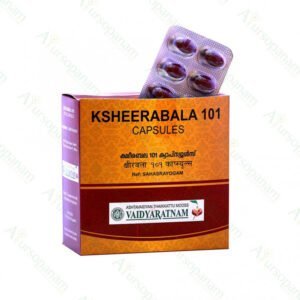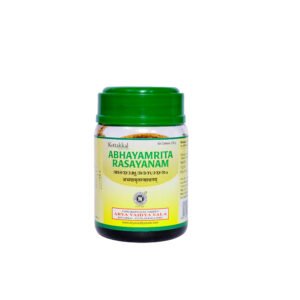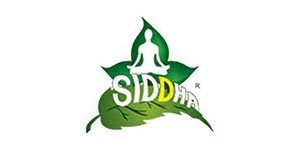Vilwa or Aegle marmelos is the chief ingredient in this traditional recipe that pacifies vitiated Kapha and Pitta elements in the gut and bowel. A nourishing and mild combination, Mahavilwadi Lehyam is recommended for safe use even in children and pregnant women.
The sweet base makes it palatable and easy to use. It is beneficial in nausea, vomiting, and respiratory complaints associated with a dysfunctional gut.
Features & Benefits
- It balances the Tridoshas in the gut. Mahavilwadi Lehyam expels vitiated Kapha and Pitta elements.
- It is recommended for safe use in the children and the pregnant.
- Mahavilwadi Lehyam also relieves indigestion, flatulence and acidity in the gut.
- It is beneficial in the treatment of vomiting, lack of appetite, bronchial asthmatic complaints.
- It pacifies aggravated Vata in the gut. Soothes inflammatory complaints.
- Mahavilwadi Lehyam relieves nausea and respiratory discomfort in pregnant women.
Dosage and Instructions
Adult: 5-10 gms of Mahavilwadi Lehyam once or twice daily, as recommended by the Physician.Child: 3-5 gms of Mahavilwadi Lehyam once or twice daily, as recommended by the Physician.
Key Ingredients
Vilva (Aegle marmelos)
The Bael tree or Bilva (in Sanskrit) is an ancient Ayurvedic tree known for its spiritual and medicinal importance. It is one of the Dashamoola (group of ten roots) herb . Belpatra is said to have anti-inflammatory properties and can be applied on any inflamed region for quick relief. Bael is said to have anti-fungal and anti-viral properties, due to which it is used in treating a number of infections in our body.
Shunti (Zingiber officinalae)
Due to its strong flavor, Ginger is an essential ingredient in many Asian cuisines. Its therapeutic benefits have been recorded in Ayurvedic and Traditional Chinese Medicine. Ginger is a potent anti-nauseatic and is beneficial in treating upset stomach.Gingerol and shogaol, active components of Ginger, suppress gastric contractions. Both the fresh and dried rhizomes of Ginger suppress gastric secretion and reduce vomiting. The compounds 6-gingerol and 6-shogaol have a number of pharmacological properties, including antipyretic, analgesic, antitussive and hypotensive properties.
Maricha (Piper nigrum)
Commonly known as black pepper, it is a common ingredient of the kitchen. Its properties include Antidepressant, Antifungal, Antidiarrhoeal, Anti-inflammatory, Anti mutagenic, Anti-metastatic activity. Crushed pepper with honey relieves cold and steam inhalation along with eucalyptus reduces chest congestion.
Pippali (Piper longum)
Pippali is known as “Tridoshic” herb as it suits all body types. Thus regular consumption of Pippali in suggested quantity can help you to immune your body to quiet an extent. Pippali has Anti-microbial, Anti-inflammatory activity. Consumption of Pippali is said to exhibit anti-spasmodic action and hypoglycaemic effect which is believed to lower blood sugar level. It is also reported to be antagonist in respiratory depression. Also due to its cooling post-digestive effect consumption of Pippali is considered as a safe and effective option to avoid all sorts of digestive disorders.
Chavya (Piper chaba)
Chavya is useful in treating indigestion, abdominal colic, worm infestation, poisoning, anorexia, productive cough, asthma, bronchitis, fever, diarrhea, IBS, hemorrhoids, piles, fistula, chronic respiratory disorders, throat disorders, and rheumatic conditions.
Taleesa Patram (Abies Webbiana)
Commonly known as East Himalayan fir, its aroma has potential to cure mild headache and relieve mental stress. Leaves are helpful in diseases such as cough, asthma, chronic bronchitis, common cold, sneezing, allergic rhinitis and upper respiratory infections.
Nagakesara (Messua ferrea)
Ironwood Tree possesses many therapeutic benefits. It is a hemostatic that stops bleeding and is also an anti-inflammatory. The Ayurvedic Pharmacopoeia of India recommends the use of the plant in gout, hemorrhagic disorders and diseases of the urinary bladder.
Chithraka(Plumbago zeylanica)
Chitraka is a potent digestive medicine used for treating a host of ailments including indigestion, constipation, anorexia, abdominal distension, stomatitis, abdominal pain, etc. Imbued with digestive, caustic, stimulant and carminative properties, it eliminates harmful AMA toxins from the body which has accumulated due to malabsorption of food particles.
Ela (Elettaria cardamomum)
Commonly called Elaichi, it has very good anti-bacterial and anti-fungal properties. It helps in reducing inflammation. Cardamon is often given the epithet Queen of Spices as it is used to flavor food in many countries. in addition, the herb has several health benefits. The German Commission E has indicated the use of Cardamom in dyspepsia and as a cholagogue, which promotes bile discharge from the system. The herb is also helpful in treating gum and teeth infections, throat congestion and kidney disorders.
Jeerakam (Cuminum cyminum)
Cumin is an Indian Spice as well as ayurvedic medicine used for several diseases of the digestive, respiratory, circulatory, and reproductive system.
Karpoora (Cinnamomum Camphora)
Camphor acts as a counter irritant and is therefore used topically to relieve pain and swelling. It causes numbness of sensory nerve endings of skin, thereby reliving pain and inflammation, and preventing skin redness. It helps to cure swelling of various body parts so give relief to joints pain.
















































Ratings & Customer Reviews
Reviews
There are no reviews yet.